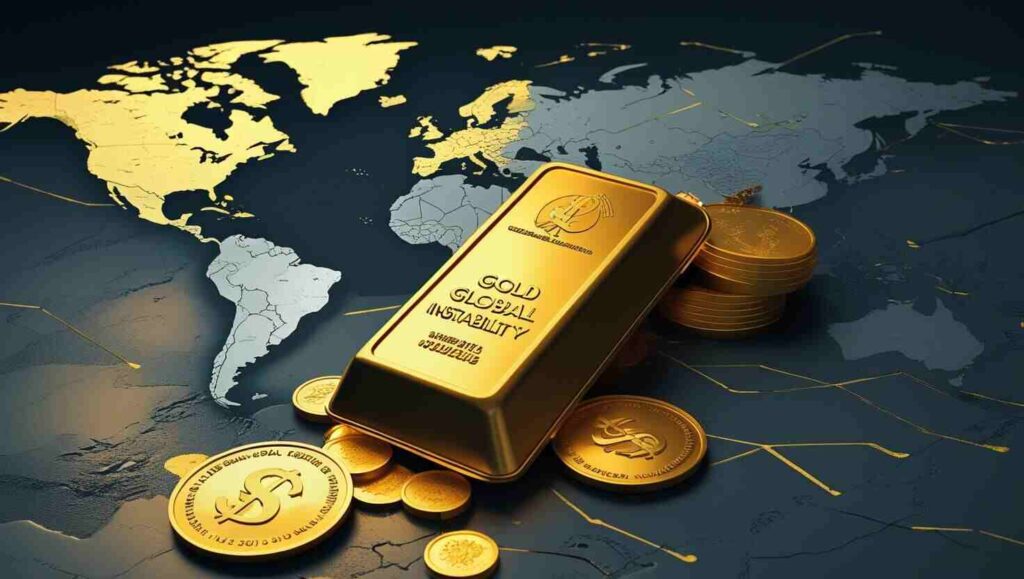Why Gold Safe-Haven Demand Spikes Amid Middle East Tensions
Why Gold Safe-Haven Demand Spikes Amid Middle East Tensions: Gold is a timeless and trusted investment asset, often called a “safe haven” during economic uncertainty or geopolitical Middle East Tensions. Unlike paper currency, gold holds intrinsic value and is globally recognized, making it a go-to choice for investors looking to preserve wealth and hedge against inflation. Its price typically rises during market volatility, making it a reliable store of value in both short-term crises and long-term financial planning. Whether in physical form or through (Exchange Traded Fund)ETFs, gold remains a powerful tool in a diversified investment strategy.
Why did the demand of gold increase?
Why did the demand of gold increase?: The demand for gold increased primarily due to rising global uncertainty, especially amid escalating geopolitical tensions like those in the Middle East. Investors view gold as a safe-haven asset that protects wealth during times of market volatility, inflation, or conflict. As stock markets waver and oil prices surge, many shift their money into gold to preserve value and hedge against potential losses. This surge in demand often leads to a noticeable rise in gold prices during such periods.
Introduction: Why Gold Becomes the Go-To Asset in Times of Crisis
Whenever the world faces geopolitical uncertainty—especially in regions like the Middle East—investors instinctively turn to gold. Why? Because gold is widely viewed as a safe-haven asset, offering security when traditional markets like stocks and currencies are rattled.
From oil supply disruptions to armed conflicts like the ongoing Israel-Iran tensions, the ripple effects often spark financial market volatility—and history shows that gold prices usually surge during such events.

The Geopolitical Connection: Middle East Tensions and Market Panic
The Middle East plays a crucial role in global energy supply and political stability. So when there’s conflict—such as a sudden airstrike, military retaliation, or a wider regional escalation—investors begin to pull money from risky assets like stocks and redirect it to gold.
Key reasons gold demand spikes during Middle East conflicts:
- Fear of market instability
- Disruption in oil supplies, leading to inflation
- Currency fluctuations (especially USD and emerging market currencies)
- Widespread investor uncertainty
For example, in June 2025, amid a sharp rise in Israel-Iran hostilities, gold jumped over 2% in a single day, while the S&P 500 and Nasdaq posted noticeable losses.
Go to Homepage
Historical Patterns: Gold’s Track Record as a Crisis Asset
Gold has consistently risen during times of international tension:
| YEAR | Event | Gold Price Reaction |
| 2003 | Iraq War | ↑ 15% in 3 months |
| 2019 | US-Iran tensions | ↑ 4% in a week |
| 2022 | Russia-Ukraine War | ↑ 7% in 10 days |
| 2025 | Israel-Iran conflict | ↑ 2.1% (so far) |
These surges are driven by a flight to safety—a strategy where investors exit riskier positions and park capital in more stable assets like gold, U.S. Treasuries, and the Swiss franc.
Why Gold? The Psychology Behind the Safe-Haven Demand
Gold is more than just a shiny metal. Here’s why it earns its “safe-haven” status:
- It holds intrinsic value – unlike paper currencies that may devalue.
- It’s globally accepted and liquid – gold markets remain open even in times of financial disruption.
- It hedges against inflation– oil-related inflation spikes often accompany Middle East conflicts.
- It offers no counterparty risk – unlike bonds or equities, gold is not someone else’s liability.
How Investors Respond: Common Safe-Haven Strategies
During geopolitical tensions, smart investors often
- Buy gold ETFs like SPDR Gold Shares (GLD)
- Invest in physical gold or sovereign gold bonds
- Diversify into other safe assets like U.S. Treasury bonds and defensive stocks
- Exit high-volatility sectors (e.g., tech, emerging markets)
Retail investors also turn to silver, though gold remains the dominant safe-haven choice due to its stability and historical performance.
What This Means for You: Should You Buy Gold During Tensions?
If you’re an investor wondering what to do during periods of geopolitical instability
- Yes, gold can provide portfolio protection—but it should be a part of a diversified mix.
- Don’t chase gold at its peak—look for gradual entry points or cost-averaging strategies
- Monitor global events, inflation signals, and central bank responses to time your moves smartly.
Final Thoughts: Gold’s Role in an Uncertain World
Gold’s rise during Middle East tensions is not a coincidence—it’s a result of decades of market behavior rooted in uncertainty, inflation concerns, and fear of systemic collapse.
For financial security and peace of mind during uncertain times, gold continues to shine—not just as an investment, but as a symbol of resilience.
FAQs
Q1: Why does gold perform well during Middle East conflicts?
Because investors seek safety when stock markets fall, and gold historically retains its value in uncertain times.
Q2: How quickly does gold react to geopolitical news?
Often within minutes to hours. Real-time financial markets price in risk almost immediately.
Q3: Is it safe to buy gold after a major geopolitical event?
Yes, but consider the timing and use dollar-cost averaging to reduce risk?
